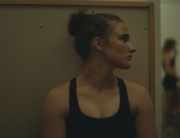A beautifully shot coming-of-age story set on the Croatian coast, Murina dwells over a young girl’s disillusionment with the adults in her life and the narrowness of her existence. Poetic artistry and morose brooding fight it out for the upper hand in Antoneta Alamat Kusijanovic’s debut film, which can feel like a fresh dip in the sea one minute and an airless dunking in deep water the next.
Emotions run high in a seaside household. Father Ante (Leon Lucev) and his wife, Nela (Danica Curcic), await a powerful figure from their past as a potential buyer for their seafront property. Their strong, vital 17-year-old daughter, Julija (Gracija Filipovic), spends most of her time in a bathing suit underwater with a snorkeling mask and spear gun. That’s because the water feels both like her natural element and an ideal place to submerge turbulent emotions; the underwater footage sequences become a powerful visual motif and highlight of the movie. In the sea or on the beach, Julija now and then gazes wistfully at young people cavorting on a nearby yacht. Their freedom seems to only emphasize the constriction of her life at home.
A home that is about to explode with the arrival of Ante’s old friend Javier. Played by charismatic Cliff Curtis, Javier is a sexy tycoon with a lot of money, a carefree manner, and a twinkle in his eye. His commanding yet emollient presence gets the women of the house aflutter. Javier only stirs the pot by flirting with both the resigned Nela and hopeful Julija, arousing in them hopes of escape. In response, Ante blows up into escalating outbursts of misdirected rage—episodes that a wise businessman would avoid throwing in front of a prospective buyer. Will Javier buy Ante’s property and develop it into a resort? And more crucially, will he pry away either mother or daughter from Ante’s abusive and suffocating household?
Murina makes some sharp observations about perennial tensions within a family. A spot-on portrait of impotent anger and classic toxic masculinity, Ante still loves Julija and her mother in his controlling way. As happens with so many teens, Julija’s exploration of her budding sexuality provokes those closest to her—“You have shoulders like a boy’s” sneers her dad in contempt. The disappointment of the older woman in a family is another theme worth exploring. But amid the slice-of-life realism, it’s frustrating to see women of both ages simper and sigh over a man who can plainly deliver only empty promises. Javier’s assurance to the outdoorsy, unsophisticated Julija that she is Harvard material is an obvious blandishment even a teenager could see through.
What rescues Murina from sinking under its own weight are its lyrical themes of eternity and cyclical tides, underscored by wide shots that emphasize its cast’s tiny stature within the vastness of nature. The sea, it is implied, dwarves our ambitions and helps us give ourselves up to greater forces. Whether that compensation can make life bearable is a question the film leaves open.

















Leave A Comment